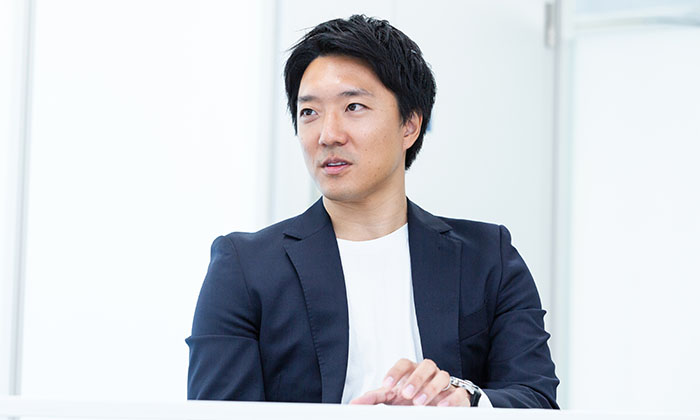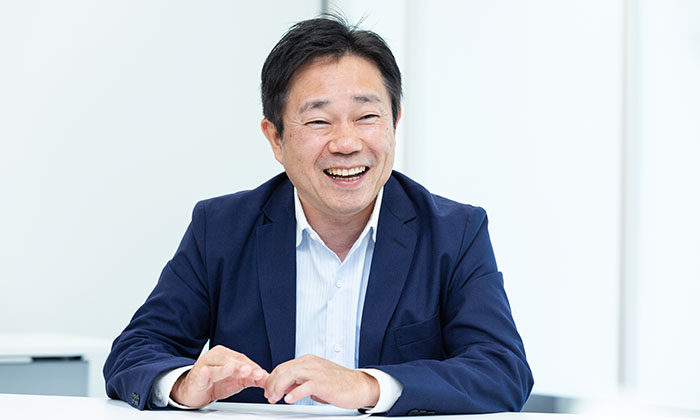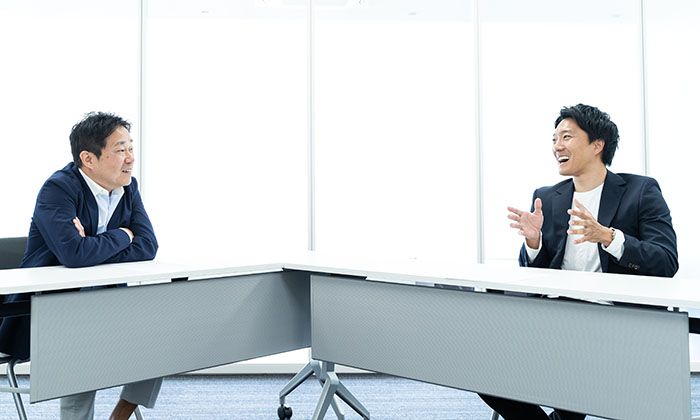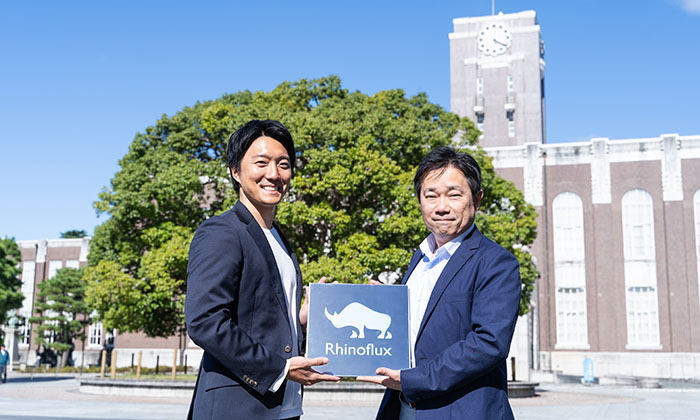Contact UsCONTACT
Please feel free to contact us if you have any questions or concerns.
Inquiry FormStories
STORIES
SERIES EMBARK
![[Special Edition] The first EIR-iCAP startup is born (Part2)](https://www.kyoto-unicap.co.jp/cms/wp-content/uploads/rhino-eyecatch2-2.jpg)
Atushi Alex Mazawa, who has been a student at Kyoto-iCAP since February 2023 as the first student of the EIR-iCAP (EIR: Entrepreneur in Residence, visiting entrepreneur) program promoted by Kyoto iCAP, established Rhinoflux Inc. in April 2024. The company is an energy startup that develops power generation devices that "reduce CO₂ emissions the more power is generated," based on a new power generation technology invented by Ryuichi Ashida, a lecturer at Kyoto University's Graduate School of Engineering. In this special edition of the "Launching Story," we present a conversation between Atushi Alex Mazawa, CEO of Rhinoflux Inc., and Nobuhiro Yagi, Executive Officer and General Manager of Investment Department 1, Kyoto-iCAP, in the first and second parts of a two-part series.
(Click here for the first part)
In the second part, we will get to the core of the CEO's mind immediately after the company's establishment, including the difficulties of steering the company, the first obstacles and prospects because of the deep-tech startup, and Mr. Mazawa's vision of what Rhinoflux Inc. will look like 20 years from now.
It's been six months since you started your business, but has your dream changed from the beginning?
We had a team meeting just the other day, and the conclusion was that our dream has not changed: we have a clear image of 2040, when our plants will be installed all over the world, and distributed power generation and CO2 capture will take place. We have created a photo of this image. We have also drawn up a concrete plan to achieve this. When a new staff member joins us, we first show him or her this image photo on the first day so that we can share a common goal toward the world we are aiming for.

That's a relief; your dream of creating the future 20 years from now, of changing the world in 2040, has not changed.
Yes, when I first met Mr. Yagi, he said to me, "Please create the future 20 years from now. I will do my best to support you toward that goal," and he was absolutely right. I have been talking with my colleagues about how listing on the stock exchange is just a passing point and a means to an end.
That is wonderful. When Mr. Mazawa joined our group, I had high expectations for him. It was not a theory or a number, but the expectation that he would do something that would move our souls. I am thrilled that you are leading Rhinoflurax as I had hoped, and I hope that in 2040, you will come back to EIR and take up the challenge once again. (Laughter)
What are some of the organizational hurdles that you are experiencing at this point?

It is about how I manage people who are better than me. I am the youngest member of the initial team, because I had a policy of only hiring people who are more talented than myself. Somewhere in the hearts of these top players, who are also amazing in terms of their careers, there may be a psychological hurdle for them to work under me, who is younger than them. On the other hand, as a leader, I also need to give them instructions. To balance the self-esteem of my talented team members and the way we are as an organization, I have to be aware of both the soft side of the human heart and the hard, theoretical side. This is something I am experiencing for the first time in my life. Until now, I have been standing around as a player, but now I am learning a great deal about how to act as a CEO and as a manager.
I understand that there are such hardships. You have only just started up, but is there a lot of pressure on you not to let the company go out of business?
I don't want the fact that I belonged to Rhinoflux, even for a time, to be a blemish to the people on the team, rather than a pressure to bring the company down. We are a startup, so we are not afraid to burn big and fail big. I think the whole team feels that way. But whether we succeed or fail, we want to be a graceful company that leaves a track record that says, "We took on a big challenge, didn't we?
Yes, I agree. I want them to take the plunge and take on challenges, and I think it's great that the reason they can't let the company go under is because they care about their members. I want the founders to take care of their technology, but I thought it was reassuring that they also care about their employees.
Many of our members are in their 30s and 40s, and some have children, including myself. Many of them are looking ahead to the next generation. Our generation can handle it even if global warming advances a little, but our children's generation will not. Regardless of whether it is a success or a failure, ideally, fathers and mothers should be able to proudly say that they took on this kind of challenge in this era. If we are going to take on challenges, I want to make this a company that can go full swing.

At this point, what are the immediate issues that need to be resolved in terms of business?
That is, to find the first penguin. Our technology, once completed and implemented in society, will create tremendous value, but we are still at the stage where the technology is not yet fully developed. It is difficult for a Japanese company to take a risk and make an investment decision before anyone else. Fortunately, we are making progress, but I am concerned about how the final decision will be made in the next few years. The challenge we need to overcome is to make sure that the customers and investors who introduce this technology feel the same way as we do and become the first penguins.
In many startups, the "why should only we, the partner companies, develop this?" question arises. This is a common story in Japan and around the world. The SBIR system (Small/Startup Business Innovation Research), which originated in the U.S., is a system in which funds are attached in million-dollar units and a government procurement framework is also attached to it, and a Japanese version has also started. The Japanese version of this program has also been launched. Business companies and startups work together to conduct demonstration experiments, and no money is taken out of the companies. However, even with this system, large companies are not always willing to take the initiative. When we invest in a startup, we have to hand it over to a larger company at the end. It is important to discuss how to make this happen smoothly, including the government's ideas. From this perspective, the startups we support, including Rhinoflux, have many adventurous elements.
The startup world is also becoming a high road of certainty, represented by Saas, where the seeds of a home run are no longer there. However, there are still many unknown elements in the world of deep tech, and the possibilities that lie therein may be interesting and exciting.
In our company, as I often talk about with our members, the technology we are refining is absolutely the process it should be from a thermodynamic point of view. When we look into how to convert the large amount of plants that exist on the earth into higher quality electricity without turning them into heat, which is said to be a graveyard of energy, the correct answer is to convert them into electricity without converting them into heat. However, the challenge for us is whether or not we can implement this in a timely manner in society with our current technology and know-how. In this sense, the results we see in five or ten years are only a cross-section of the picture, and we are trying to work from the perspective of how things will look on a longer scale. In the future, I would like to tell my own daughter that I took on these challenges and spent this kind of time in my 30s. I have no regrets no matter what the outcome. I think that is the best part of my coming to Kyoto and starting a startup in Kyoto.
Thank you very much for your wonderful talk today. Making a profit as a business is very important, and it is a basic element, but the dreams and philosophy behind it are also very important. Once again, I am very much motivated to make Kyoto-iCAP a place where these can be shared.

This interview was conducted under NEDO's "MPM: Management Personnel Matching program"
(Conducted in November 2024. Affiliations, titles, etc. as of the time of the interview)
Mr. Mazawa launched a start-up company from Kyoto University as a first-generation EIR-iCAP student. He sometimes had to face off against the in-house capitalists, and sometimes had to face off with his professors to discuss heavy issues. We at Kyoto-iCAP wholeheartedly support the future of Rhinoflux, a work that was the result of hardship!
Kyoto-iCAP is looking for challengers like Mr. Mazawa.Recruitment at any timePlease feel free to contact us for more information!

Ryuhi Kanno

Rhinoflux Inc. Website
Please feel free to contact us if you have any questions or concerns.
Inquiry Form